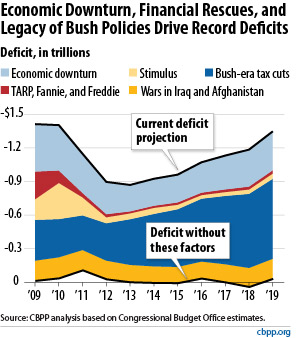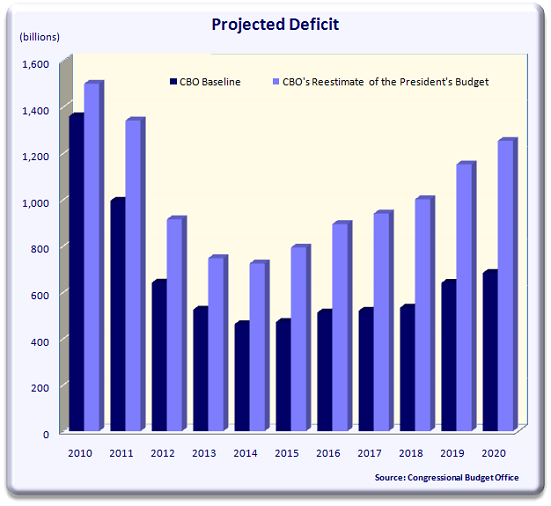Myth: The Bush tax cuts wiped out last decade's budget surpluses. Sen. John Kerry (D., Mass.), for example, has long blamed the tax cuts for having "taken a $5.6 trillion surplus and turned it into deficits as far as the eye can see." That $5.6 trillion surplus never existed. It was a projection by the Congressional Budget Office (CBO) in January 2001 to cover the next decade. It assumed that late-1990s economic growth and the stock-market bubble (which had already peaked) would continue forever and generate record-high tax revenues. It assumed no recessions, no terrorist attacks, no wars, no natural disasters, and that all discretionary spending would fall to 1930s levels.
I've analyzed CBO's 28 subsequent budget baseline updates since January 2001. These updates reveal that the much-maligned Bush tax cuts, at $1.7 trillion, caused just 14% of the swing from projected surpluses to actual deficits (and that is according to a "static" analysis, excluding any revenues recovered from faster economic growth induced by the cuts).
If there were no Bush tax cuts, runaway spending and economic factors would have guaranteed more than $4 trillion in deficits over the decade and kept the budget in deficit every year except 2007.
Mr. Obama asserted in his January State of the Union Address that by the time he took office, "we had a one-year deficit of over $1 trillion and projected deficits of $8 trillion over the next decade. Most of this was the result of not paying for two wars, two tax cuts, and an expensive prescription drug program."
In short, it's all President Bush's fault. But Mr. Obama's assertion fails on three grounds.
First, the wars, tax cuts and the prescription drug program were implemented in the early 2000s, yet by 2007 the deficit stood at only $161 billion. How could these stable policies have suddenly caused trillion-dollar deficits beginning in 2009? (Obviously what happened was collapsing revenues from the recession along with stimulus spending.)
Related
Second, the president's $8 trillion figure minimizes the problem. Recent CBO data indicate a 10-year baseline deficit closer to $13 trillion if Washington maintains today's tax-and-spend policies—whereby discretionary spending grows with the economy, war spending winds down, ObamaCare is implemented, and Congress extends all the Bush tax cuts, the Alternative Minimum Tax (AMT) patch, and the Medicare "doc fix" (i.e., no reimbursement cuts).
Under this realistic baseline, the 10-year cost of extending the Bush tax cuts ($3.2 trillion), the Medicare drug entitlement ($1 trillion), and Iraq and Afghanistan spending ($515 billion) add up to $4.7 trillion. That's approximately one-third of the $13 trillion in baseline deficits—far from the majority the president claims.
Third and most importantly, the White House methodology is arbitrary. With Washington set to tax $33 trillion and spend $46 trillion over the next decade, how does one determine which policies "caused" the $13 trillion deficit? Mr. Obama could have just as easily singled out Social Security ($9.2 trillion over 10 years), antipoverty programs ($7 trillion), other Medicare spending ($5.4 trillion), net interest on the debt ($6.1 trillion), or nondefense discretionary spending ($7.5 trillion).
There's no legitimate reason to single out the $4.7 trillion in tax cuts, war funding and the Medicare drug entitlement.
Entitlements and other obligations are driving the deficits. Specifically, Social Security, Medicare, Medicaid and net interest costs are projected to rise by 5.4% of GDP between 2008 and 2020. The Bush tax cuts are a convenient scapegoat for past and future budget woes. But it is the dramatic upward arc of federal spending that is the root of the problem.



